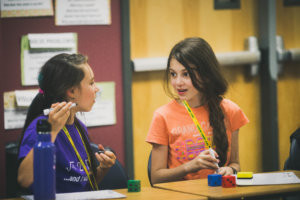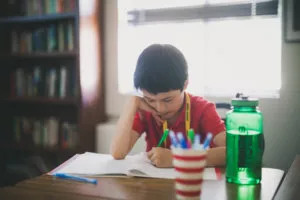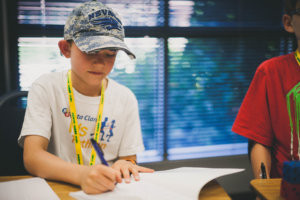Determining if your child is gifted can be a journey filled with questions. “How Do You Know If Your Child Is Gifted?” is a question that many parents ponder. At lawyergift.net, we understand the unique challenges and joys of nurturing gifted children. This guide provides insights into identifying giftedness, understanding assessments, and finding resources to support your child’s exceptional abilities, helping you find the perfect gifts for lawyers and those with exceptional minds. Discover now how to ensure they get the support they deserve, including finding the perfect gifts for lawyers and those with exceptional minds and nurture their talents.
1. What Defines a Gifted Child?
The definition of a gifted child often involves a complex interplay of exceptional abilities. According to the National Association for Gifted Children (NAGC), gifted children demonstrate abilities significantly above the norm for their age. But what does this really look like?
Giftedness isn’t confined to academic prowess. It can manifest in various ways, including:
- Intellectual Giftedness: Demonstrated by rapid learning, advanced comprehension, and a thirst for knowledge.
- Creative Giftedness: Displayed through original thinking, innovative problem-solving, and artistic expression.
- Academic Giftedness: Evident in excelling in specific subject areas like math, science, or language arts.
- Artistic Giftedness: Seen in extraordinary talent in music, art, drama, or other creative fields.
- Leadership Giftedness: Shown through the ability to motivate, inspire, and guide others.
It’s important to recognize that giftedness isn’t a one-size-fits-all label. Each gifted child is unique, with their own strengths, weaknesses, and learning styles. Understanding the multifaceted nature of giftedness is the first step in identifying and supporting these exceptional individuals.
2. What Are the Early Signs of Giftedness in Children?
Identifying giftedness early can help you tailor your child’s environment to foster their potential. While every child is unique, some common signs may indicate giftedness.
Here are some early indicators:
- Exceptional Memory: Remembering details and information with ease.
- Advanced Vocabulary: Using complex words and phrases at a young age.
- Early Reading: Learning to read earlier than their peers.
- Intense Curiosity: Asking endless questions and wanting to explore everything.
- Problem-Solving Skills: Figuring out puzzles and challenges with ease.
- Creative Thinking: Coming up with original ideas and solutions.
- Heightened Sensitivity: Showing strong emotions and empathy.
- Long Attention Span: Focusing on tasks for extended periods, especially when interested.
Keep in mind that not all gifted children will exhibit all of these signs. Some may excel in certain areas while showing average abilities in others. Observation, patience, and a supportive approach are key to identifying and nurturing giftedness.
 A young girl with a thoughtful expression, possibly indicating intellectual curiosity
A young girl with a thoughtful expression, possibly indicating intellectual curiosity
3. What Are the Intellectual Characteristics of Gifted Children?
Intellectual giftedness extends beyond simply being “smart.” It involves a unique cognitive profile characterized by several distinct traits. Recognizing these characteristics can help you better understand your child’s intellectual strengths and needs.
Key intellectual characteristics of gifted children include:
- Rapid Learning: Grasping new concepts quickly and easily.
- Advanced Comprehension: Understanding complex ideas and abstract concepts.
- Exceptional Memory: Retaining information with remarkable accuracy.
- Critical Thinking: Analyzing information and forming logical conclusions.
- Problem-Solving Skills: Approaching challenges with creativity and resourcefulness.
- Abstract Reasoning: Understanding and manipulating abstract concepts.
- Intellectual Curiosity: Displaying a strong desire to learn and explore new ideas.
- Love of Learning: Enjoying intellectual challenges and seeking out new knowledge.
Gifted children often demonstrate these traits at an early age, setting them apart from their peers. By understanding these intellectual characteristics, you can provide your child with the stimulation and support they need to thrive academically and intellectually.
4. How Do Gifted Children Behave Emotionally and Socially?
Giftedness isn’t just about intellect; it also affects a child’s emotional and social development. Gifted children often experience the world in a more intense and nuanced way, leading to unique social and emotional characteristics.
Common emotional and social traits of gifted children include:
- Heightened Sensitivity: Experiencing emotions more deeply and intensely.
- Empathy: Showing a strong understanding and concern for others’ feelings.
- Perfectionism: Striving for excellence and being critical of their own work.
- Sense of Justice: Having a strong moral compass and concern for fairness.
- Intense Interests: Becoming deeply absorbed in specific topics or activities.
- Nonconformity: Questioning rules and conventions and thinking outside the box.
- Asynchronous Development: Experiencing uneven development in different areas.
- Social Isolation: Feeling different from their peers and struggling to fit in.
These emotional and social characteristics can present both challenges and opportunities for gifted children. Understanding these traits can help you provide them with the emotional support, social skills, and coping strategies they need to navigate their unique experiences.
5. How Can Testing and Assessment Help Identify Giftedness?
Testing and assessment play a crucial role in identifying giftedness, providing valuable insights into a child’s abilities, strengths, and needs. While tests alone cannot fully capture the complexity of giftedness, they can offer objective data to support your observations and inform educational planning.
Here’s how testing and assessment can help:
- Identify Specific Abilities: Tests can pinpoint specific areas of strength, such as verbal reasoning, mathematical ability, or spatial skills.
- Compare Performance to Norms: Standardized tests compare a child’s performance to a large group of peers, providing a percentile ranking.
- Identify Learning Needs: Assessments can reveal learning styles, cognitive processing strengths and weaknesses, and potential learning disabilities.
- Inform Educational Placement: Test results can help determine appropriate grade placement, course selection, and gifted program eligibility.
- Track Progress Over Time: Regular assessments can monitor a child’s academic growth and identify areas where they may need additional support.
It’s important to remember that testing is just one piece of the puzzle. A comprehensive assessment should also include observations, interviews, and a review of a child’s work samples to provide a holistic picture of their abilities and needs.
6. What Types of Tests Are Used to Assess Giftedness?
Various tests can be used to assess giftedness, each with its own strengths and limitations. Understanding the different types of tests can help you make informed decisions about which assessments are right for your child.
Here are some common types of tests used to assess giftedness:
- Intelligence Tests (IQ Tests): These tests measure a range of cognitive abilities, including verbal reasoning, visual-spatial skills, and working memory. Examples include the Wechsler Intelligence Scale for Children (WISC) and the Stanford-Binet Intelligence Scales.
- Achievement Tests: These tests measure a child’s knowledge and skills in specific academic areas, such as reading, math, and writing. Examples include the Woodcock-Johnson Tests of Achievement and the Wide Range Achievement Test (WRAT).
- Aptitude Tests: These tests measure a child’s potential to succeed in specific areas, such as music, art, or mechanical skills.
- Creativity Tests: These tests assess a child’s ability to think creatively, generate original ideas, and solve problems in novel ways. Examples include the Torrance Tests of Creative Thinking.
- Above-Level Tests: Tests designed for older students that can provide a better measure of a gifted child’s abilities when they exceed the norms for their age group. The PSAT 8/9, SAT, and ACT are common examples.
When choosing tests for your child, consider their age, abilities, and the specific questions you’re hoping to answer. Consulting with a qualified psychologist or educational specialist can help you select the most appropriate assessments.
 A child concentrating while working on a puzzle, illustrating problem-solving skills
A child concentrating while working on a puzzle, illustrating problem-solving skills
7. When Is the Right Time to Have My Child Tested for Giftedness?
Determining the optimal time to have your child tested for giftedness depends on various factors, including your child’s development, your concerns, and the purpose of testing.
While there’s no magic age for testing, here are some general guidelines:
- Early Childhood (Ages 3-5): Testing at this age can be challenging due to the rapid development of young children. However, if you have significant concerns about your child’s development or suspect exceptional abilities, early screening may be helpful.
- Elementary School (Ages 6-12): This is a common time for gifted testing, as children’s abilities become more apparent and standardized tests are more reliable. Testing can help inform educational placement and programming decisions.
- Middle School (Ages 11-14): Testing at this age can help identify students who may benefit from advanced coursework, enrichment opportunities, or specialized programs.
- High School (Ages 14-18): Testing can help students explore college options, identify career interests, and access scholarships and other opportunities.
Ultimately, the decision of when to test your child is a personal one. Consider your child’s individual needs and consult with professionals to determine the best course of action.
8. What Are the Benefits of Identifying Giftedness?
Identifying giftedness can provide numerous benefits for both the child and their family. Understanding a child’s unique abilities and needs can lead to more effective parenting, educational planning, and emotional support.
Here are some key benefits of identifying giftedness:
- Understanding Your Child: Identification can help you understand your child’s strengths, weaknesses, learning style, and emotional needs.
- Tailored Education: Knowing your child is gifted allows you to advocate for appropriate educational opportunities that meet their unique needs. This might include gifted programs, advanced classes, or individualized instruction.
- Emotional Support: Understanding and accepting your child’s giftedness can improve their self-esteem and emotional well-being.
- Social Connections: Identifying other gifted children can provide your child with a sense of belonging and opportunities to connect with like-minded peers.
- Access to Resources: Identification can open doors to resources such as gifted organizations, summer programs, and scholarships.
- Preventing Underachievement: Recognizing giftedness can help prevent boredom, frustration, and underachievement in school.
By understanding and embracing your child’s giftedness, you can help them reach their full potential and lead a fulfilling life.
9. What Are Some Challenges Faced by Gifted Children?
While giftedness brings many advantages, it also presents unique challenges. Gifted children often face social, emotional, and academic difficulties that require understanding and support.
Some common challenges faced by gifted children include:
- Perfectionism: Striving for unrealistic standards and fearing failure.
- Underachievement: Becoming bored and disengaged in school, leading to poor performance.
- Social Isolation: Feeling different from peers and struggling to fit in.
- Emotional Intensity: Experiencing emotions more deeply and intensely, leading to anxiety or depression.
- Asynchronous Development: Having uneven development in different areas, leading to frustration.
- Twice-Exceptionality: Having both giftedness and a learning disability or other challenge.
- Misdiagnosis: Being misdiagnosed with ADHD or other conditions due to their intensity and high energy.
It’s important to recognize these challenges and provide gifted children with the support they need to overcome them. This might include counseling, mentoring, gifted programs, or accommodations in school.
10. Where Can I Find Resources and Support for Gifted Children?
Navigating the world of giftedness can be overwhelming, but many resources and support systems are available to help you and your child.
Here are some valuable resources:
- National Association for Gifted Children (NAGC): Offers information, resources, and advocacy for gifted children and their families.
- Supporting Emotional Needs of the Gifted (SENG): Provides resources and support for the social and emotional needs of gifted children.
- Davidson Institute: Supports profoundly gifted students through scholarships, programs, and resources.
- Hoagies’ Gifted Education Page: A comprehensive online resource for all things gifted.
- State Gifted Associations: Many states have their own gifted associations that offer local resources and support.
- Gifted Programs: Schools and districts often offer gifted programs that provide enrichment and acceleration opportunities.
- Counselors and Therapists: Mental health professionals specializing in giftedness can provide valuable support for children and families.
By tapping into these resources, you can connect with other parents, learn about best practices, and find the support you need to help your gifted child thrive.
 A group of children collaborating on a project, symbolizing teamwork and social interaction
A group of children collaborating on a project, symbolizing teamwork and social interaction
11. How Can I Support My Gifted Child at Home?
Creating a supportive and stimulating home environment is crucial for nurturing your gifted child’s potential. Here are some strategies for supporting your gifted child at home:
- Provide Intellectual Stimulation: Offer challenging books, puzzles, games, and activities that stimulate their minds.
- Encourage Curiosity: Answer their endless questions and encourage them to explore their interests.
- Support Creativity: Provide opportunities for creative expression, such as art supplies, musical instruments, or writing materials.
- Promote Independence: Encourage them to take on challenges and solve problems independently.
- Foster a Love of Learning: Make learning fun and engaging, and celebrate their intellectual curiosity.
- Provide Emotional Support: Listen to their concerns, validate their feelings, and help them develop coping skills.
- Connect with Other Gifted Children: Arrange playdates or activities with other gifted children to provide social connections.
- Advocate for Their Needs: Work with their school to ensure they receive appropriate educational opportunities.
Remember, every gifted child is unique, so tailor your approach to meet their individual needs and interests.
12. How Can I Advocate for My Gifted Child at School?
Advocating for your gifted child at school is essential to ensure they receive the appropriate educational opportunities and support. Here are some tips for advocating for your gifted child:
- Communicate with Teachers: Establish open communication with your child’s teachers and share information about their giftedness.
- Request Differentiated Instruction: Ask teachers to provide challenging assignments and activities that meet your child’s needs.
- Explore Acceleration Options: Consider grade skipping, subject acceleration, or early college entrance if appropriate.
- Advocate for Gifted Programs: Support the development and implementation of gifted programs in your school district.
- Attend IEP Meetings: If your child has an Individualized Education Program (IEP), attend meetings and advocate for their needs.
- Know Your Rights: Familiarize yourself with state and federal laws regarding gifted education.
- Join Parent Organizations: Connect with other parents of gifted children to share information and support each other.
By working collaboratively with school staff, you can ensure that your gifted child receives the education they deserve.
13. What is Twice-Exceptionality (2e) and How Does It Affect Gifted Children?
Twice-exceptionality (2e) refers to children who are both gifted and have a learning disability, ADHD, or other challenge. These children possess exceptional abilities in some areas but struggle in others, making their needs complex and often misunderstood.
Here’s how twice-exceptionality affects gifted children:
- Hidden Talents: Their giftedness may be masked by their learning disability, leading to underachievement.
- Frustration and Anxiety: They may experience frustration and anxiety due to their struggles in certain areas.
- Misdiagnosis: Their learning disability may be misdiagnosed as a lack of motivation or effort.
- Low Self-Esteem: They may develop low self-esteem due to their academic struggles.
- Need for Specialized Support: They require specialized support that addresses both their giftedness and their learning disability.
Identifying and supporting twice-exceptional children requires a comprehensive assessment and individualized educational plan. By addressing their unique needs, you can help them overcome their challenges and reach their full potential.
14. How Can Technology Be Used to Support Gifted Children?
Technology offers a wealth of resources and tools that can support gifted children’s learning and development. Here are some ways technology can be used to support gifted children:
- Online Learning Platforms: Access online courses, tutorials, and educational resources that cater to their interests and abilities.
- Educational Apps: Use educational apps that provide challenging and engaging learning experiences.
- Virtual Field Trips: Explore museums, historical sites, and other places around the world through virtual field trips.
- Coding and Programming: Learn coding and programming skills to develop problem-solving and logical thinking abilities.
- Digital Art and Music: Create digital art and music using software and apps.
- Research Tools: Access online databases, journals, and research tools to explore their interests in depth.
- Collaboration Tools: Collaborate with other gifted children on projects and share ideas through online platforms.
By leveraging technology, you can provide your gifted child with access to a world of knowledge and opportunities.
15. What Are Some Gift Ideas for Gifted Children?
Finding the perfect gifts for gifted children can be a rewarding challenge. Look for gifts that stimulate their minds, encourage their creativity, and align with their interests. And remember, at lawyergift.net we have fantastic gifts for lawyers and other exceptional people!
Here are some gift ideas for gifted children:
| Category | Gift Ideas |
|---|---|
| STEM | Science kits, robotics kits, telescopes, microscopes, coding toys |
| Arts & Crafts | High-quality art supplies, pottery wheel, calligraphy set, jewelry-making kit |
| Brain Teasers | Puzzles, strategy games, logic games, escape room games |
| Books | Non-fiction books on their favorite topics, classic literature, biographies, graphic novels |
| Experiences | Museum memberships, tickets to concerts or theater performances, summer programs, travel opportunities |
| Personalized | Custom-made books featuring them as the main character, personalized stationery, engraved desk accessories |
| Law Related | For the budding legal mind, consider a miniature gavel, a law book for children, or even a mock trial kit. Great for sparking interest in law careers! |
When choosing gifts, consider your child’s age, interests, and abilities. And remember, the best gifts are those that spark their curiosity and inspire them to learn and grow.
Choosing a gift that resonates with their passions can inspire and motivate them, aligning perfectly with their intellectual curiosity. Explore lawyergift.net for unique and thoughtful presents, including custom bobbleheads that reflect their personality.
 A child smiling while holding a science kit, representing STEM learning and exploration
A child smiling while holding a science kit, representing STEM learning and exploration
FAQ: Understanding Giftedness in Children
| Question | Answer |
|---|---|
| What is the definition of a gifted child? | A gifted child demonstrates abilities significantly above the norm for their age, including intellectual, creative, academic, and artistic talents. |
| What are some early signs of giftedness? | Exceptional memory, advanced vocabulary, early reading, intense curiosity, problem-solving skills, and creative thinking are some of the early signs of giftedness. |
| How can testing help identify giftedness? | Testing can identify specific abilities, compare performance to norms, identify learning needs, inform educational placement, and track progress over time. |
| What are the challenges faced by gifted children? | Perfectionism, underachievement, social isolation, emotional intensity, and asynchronous development are some of the challenges faced by gifted children. |
| How can I support my gifted child at home? | Provide intellectual stimulation, encourage curiosity, support creativity, promote independence, foster a love of learning, and provide emotional support to your gifted child. |
| Where can I find resources for gifted children? | The National Association for Gifted Children (NAGC), Supporting Emotional Needs of the Gifted (SENG), and Davidson Institute are great resources for gifted children and their families. |
| What is twice-exceptionality (2e)? | Twice-exceptionality (2e) refers to children who are both gifted and have a learning disability, ADHD, or other challenge. |
| How can technology support gifted children? | Online learning platforms, educational apps, virtual field trips, coding and programming tools, digital art and music software, and research tools can support gifted children’s learning. |
| What are some gift ideas for gifted children? | Science kits, robotics kits, high-quality art supplies, puzzles, strategy games, non-fiction books, and museum memberships are great gift ideas for gifted children. |
| How can I advocate for my gifted child at school? | Communicate with teachers, request differentiated instruction, explore acceleration options, advocate for gifted programs, attend IEP meetings, and know your rights to advocate for your child. |
| What kind of gifts on lawyergift.net are suitable for gifted children? | At lawyergift.net, custom bobbleheads that reflect their personality and intellectual pursuits make ideal gifts for gifted children, inspiring creativity and celebrating individuality. |
Find the Perfect Gift for the Exceptional Mind at Lawyergift.net
Are you still searching for that extraordinary gift that truly celebrates the unique talents and passions of the gifted individuals in your life? Look no further than lawyergift.net!
We understand the challenge of finding gifts that resonate with exceptional minds, and we’re here to help you discover presents that inspire, delight, and spark joy. Whether you’re shopping for a lawyer, a scholar, or a creative genius, our curated collection offers something for everyone.
Explore our website today and discover a world of thoughtful, unique, and personalized gifts that will leave a lasting impression. From custom bobbleheads that capture their personality to sophisticated desk accessories that elevate their workspace, lawyergift.net has the perfect gift for every occasion.
Ready to find that perfect gift?
- Browse our extensive collection of gifts for lawyers and other exceptional individuals.
- Search by occasion, interest, or personality to find the perfect match.
- Contact our expert team for personalized recommendations and assistance.
Address: 3210 Wisconsin Ave NW, Washington, DC 20016, United States
Phone: +1 (202) 624-2500
Website: lawyergift.net
Let lawyergift.net help you celebrate the exceptional minds in your life with gifts that truly make a difference.
